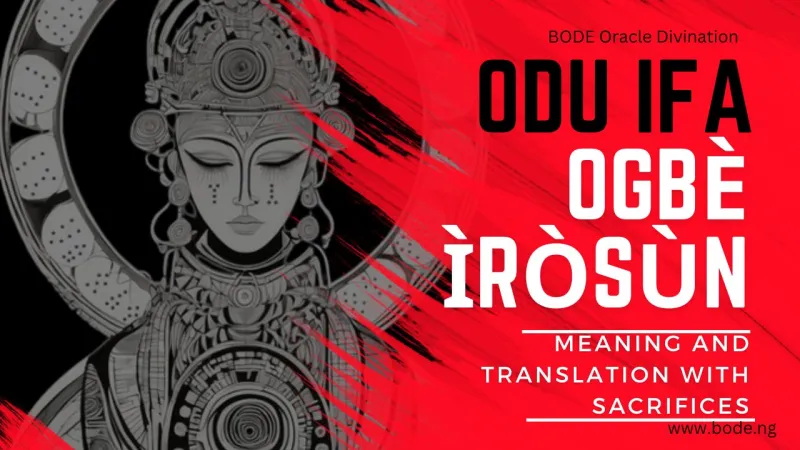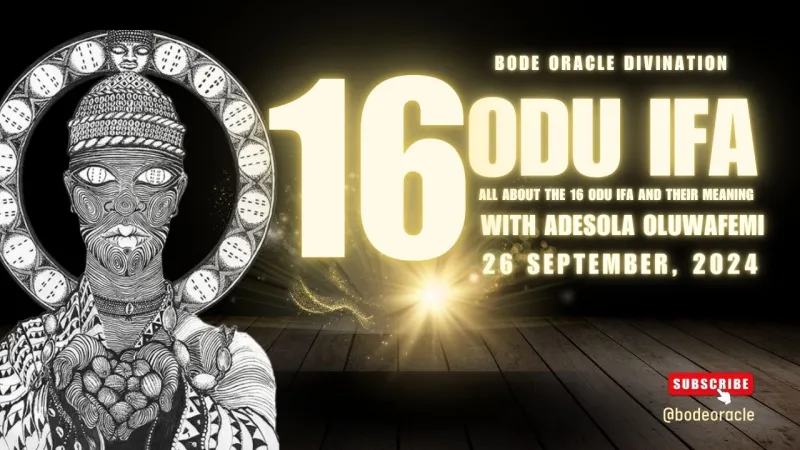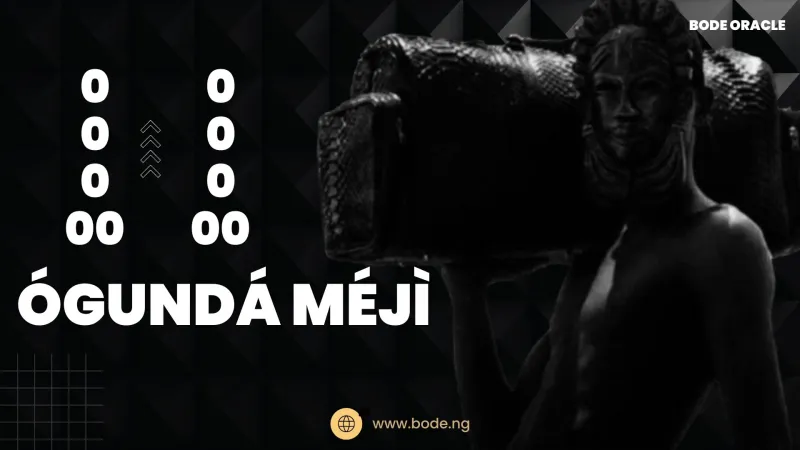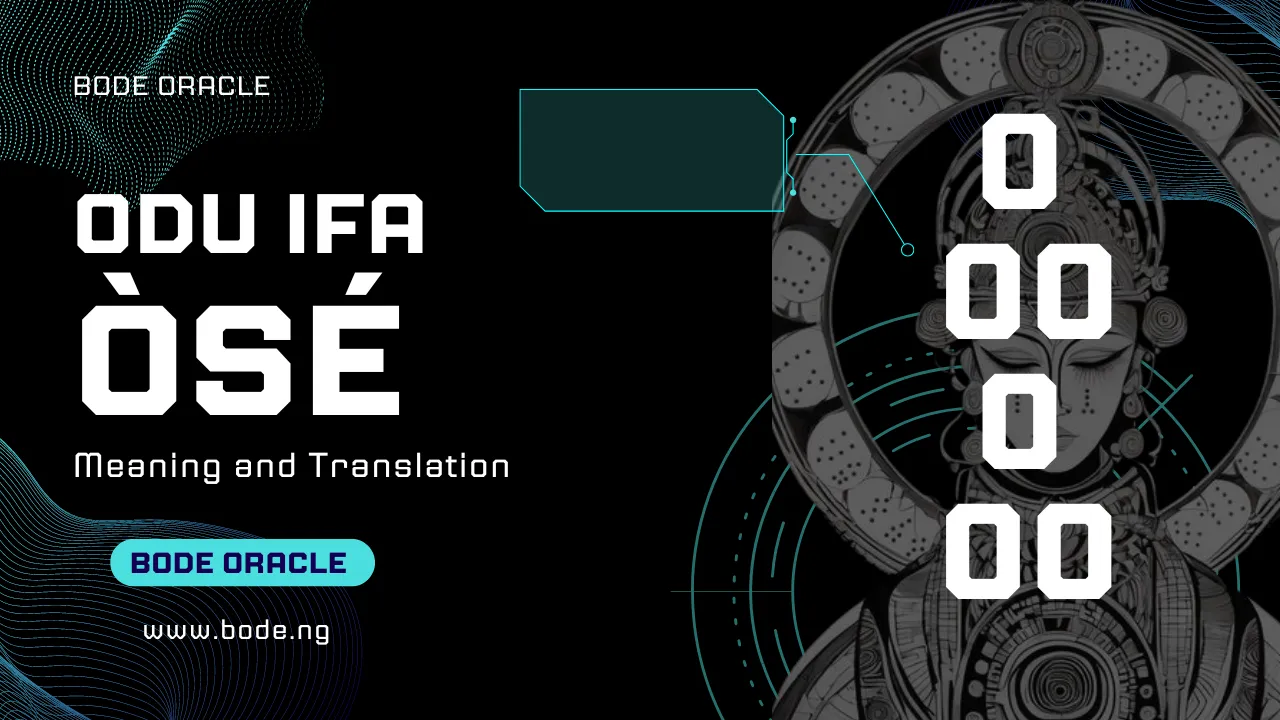Ogbè Ìròsùn, also known as Ogbè-Rorùn or Ogbe Mosun in Ifa divination, symbolizes victory over adversaries, the power of perseverance, and spiritual guidance. It is a sign that calls for offerings and rituals to overcome challenges and receive blessings.
When Ogbè Ìròsùn appears in divination, it is an indication that through patience, sacrifice, and connection with one’s destiny, success and protection will come, particularly against forces of negativity.
Ogbe Irosun, Ogbe Rorun: Ifa for Osungaga Seeking a Child
Ifa declares that the person who receives the Odu Ogbe Irosun, also called Ogbe Mosun or Ogbe-Rorun, should offer a sacrifice in order to conceive many children.
I made a small offering
I performed a small ritual
This was the Ifa cast for Osungaga
Who was crying, saying she wanted to have children.
The Osun referred to by Ifa here is a woman in the world. She longed to have children. Her attempts to conceive had been unsuccessful. She then sought the help of a Babalawo (diviner), asking for a solution to her infertility.
A divination was cast, and it was revealed that she would conceive, but only if she made the prescribed sacrifice. The sacrifice was specified, and she made the offering.
Not long after, Osun began to conceive and eventually became a mother of many children. Overjoyed, she sang praises to the Babalawos, saying:
I made a small offering
I performed a small ritual
Osungaga has now given birth to many children
I made a small offering
I performed a small ritual.
Ogbe Irosun, Ogbe Rorun: Ifa for Eleriwo and Eleda
Ifa declares that it will grant victory over enemies for the person who receives the Odu Ogbe Irosun, also called Ogbè-Rosùn or Ogbe Mosun. Ifa states that a sacrifice must be offered. It promises that the person will conquer many enemies.
The large gourd with a small, firm bottom
This was the Ifa cast for Eleriwo
It was also cast for Eleda
On the day the two of them became enemies.
Eleriwo and Eleda, referred to in this Ifa verse, were both enemies. Eleriwo was a powerful herbalist and skilled in potent medicine. Eleda, full of resentment and feeling threatened, decided to seek help.
He consulted Orunmila (the great Ifa priest), asking how He could defeat Eleriwo. Orunmila advised Eleda to offer a sacrifice. The Babalawos prescribed the sacrifice, and Eleda made the offering. The sacrifice was accepted.
Eleriwo continued using his medicine against Eleda, but the sacrifice reversed the effects of the medicine back onto Eleriwo. Eleriwo eventually died, destroyed by his own medicine.
Through the power of the sacrifice, Eleda overcame Eleriwo. After achieving victory, Eleda praised the Babalawos, the Babalawos praised Ifa, and she said:
The large gourd with a small, firm bottom
This was the Ifa cast for Eleriwo
It was also cast for Eleda
He had no powerful medicine in his hands
It was the sacrifice of Ogbe-Rosun that killed Eleriwo.
Ogbe Irosun, Ogbe Rorun: Ifa for Praise and Honor in Life
Ifa says that the person who receives the Odu Ogbè-Rosùn should offer a sacrifice of gratitude. Ifa reveals that this person has been performing good deeds, but has not been receiving any praise for their efforts. Ifa advises them to offer a sacrifice to receive acknowledgment and honor. A sacrifice is recommended.
The elephant makes its place of rest a place of honor
The ground will never tremble under the horn of a buffalo
Ayinka consulted an Oracle for Aye
They told Aye to offer a sacrifice so that he may be praised for his good deeds.
Aye referred to in this Ifa is someone who, despite doing good deeds, has been receiving ingratitude in return. Their situation became unsolvable, and he sought help.
He put one and two things together and consulted a Babalawo. The Babalawo revealed that if he made the sacrifice, people would start praising him for all the good he had done.
The sacrifice was offered on behalf of Aye. It was accepted, and as a result, everyone who had previously ignored the good deeds of Aye began to appreciate and praise him.
Filled with joy, he danced and sang, praising the Babalawos, and the Babalawos praised Ifa, saying:
The elephant makes its place of rest a place of honor
The ground will never tremble under the horn of a buffalo
Ayinka consulted an Oracle for Aye
They told Aye to offer a sacrifice so he may be praised for he's good deeds.
Everybody Always praises the Ayin Tree
With the mouth that you're using to praises me
Do not turn away
Everybody Always praises the Ayin Tree
Ogbe Irosun, Ogbe Rorun: Ifa Alukinrinjin for Orunmila Who Defeated His Enemies
Alukinrinjin, the priest of Orunmila’s house,
Cast Ifa for Orunmila.
They said the Father should offer a sacrifice
So that evil would not enter his home.
Orunmila was battling enemies at this time, and they were sending evil forces and afflictions towards him. Orunmila realized that his enemies were sending evil spirits his way, so he bent his head to consult the oracle.
He called on the Babalawos, and they cast Ifa for him and prescribed a sacrifice. Orunmila offered the sacrifice. The offering was accepted, and the ritual was complete. They also performed Ifa to provide Orunmila with a guiding light for victory.
On the first night after Orunmila lit the lamp, he used his Orisha’s sword and struck the ground, saying:
The first night, the evil spirits came,
They saw the fire in Orunmila’s house, and they heard sounds.
On the second night, the same occurred.
By the third night, they stopped coming.
This was how Orunmila defeated his enemies and the evil forces they had sent.
Ifa declared that whoever receives the Odu Ogbè-Rosùn would also be victorious over their enemies.
Divination Instruction
The person that received this odu in Ifa divination should consult a professional Babalawo or Iyanifa to prescribed and help them with sacrifice. Ifa says a sacrifice should be offered.
YORUBA Translation
Ogbe Irosun, Ogbe Mosun: Ifa Osungaga Ti N Wa Omo
Ifá pé ẹní tí ó dá Ogbe Irosun ti an pe ni Ogbe Mosun tabi Ogbé-Rorùn pé kí ó rú’bọ ki ó lè ba bí’mọ lópọlọpọ
Mo rú wéré
Mo tú wéré
A d’Ífá fún Òsùngàgàgà
Ti ńsunkun pe óun ó bí’mọ
Òsùn tí Ifá ńsọ yìí, obìnrín ni l’áyé. Ojú ọmọ ńpón, ló bá mú ééji kún ééta ló gba oko Awo lo, ńjé òun lé bi’mọ ló dá Ifá si. Wọn ni yi óò bí’mọ bọ ni kó rú. Wón yàn án l’bọ, ó rú’bọ. Kò pé Òsùn bèrè sí ńbí’mọ.
Ó si di ọlómọ pupo. ẹnu tó yá kótó, orín awo ló bọ si lé’nu, ó ní:
Mo rú wéré
Mo tú wéré
Òsùngàgàgà ló bí’mọ báwònyín
Mo rú wéré
Mo tú wéré
Ogbe Irosun, Ogbe Rorun: Ifa Eleriwo Ati Eleda
Ifá pé òun yí óò ṣé’gun ótá fún ẹni ti ó dá Ogbe Irosun, ti an pe ni Ogbè-Rosùn tabi Ogbe Mosun. Ifá pé ẹbọ ni kó rú. Ifá pé òun yi óò ba ṣé’gun ótá lópólọpọ.
Àdó ńlá a bidi kotopo
A d’Ifá fún Elériwo
A bú fún Ẹlẹda
L’ọjó tí àwọn méjèéjì jọ ńṣótá
Elériwo pelu Ẹlẹda tí Ifá nsọ yií, òtá ni áwn mejeeji, Oníṣégún tí ó gbóná gidigidi ni Eléríwo; Nidii èyi, ominú ńkọ Ẹlẹda, ni Ẹlẹda mú ééjì kún ééta ó lọ si oko awo.
Ó bere l’ówó Òrúnmìlà bí òun yí ó tí ṣe ṣẹ’gun Eléríwo. Wón ni ẹb ni Ẹlẹda ó rú. Awo yàn án l’ẹbọ, Ẹlẹda rú’bọ. Ẹbọ fin, ẹbọ dá.
Elériwo tún bere sí ní sa oogun sí Ẹlda. Ìrúb Ẹlẹda ba dá oogun Eléríwo padá si òdọ rè ni Eléríwo bá kú.
Ó fi ori ara ru èrú oogun ara rè. Ẹbọ ni Ẹlẹda fi ṣé’gun Elériwo. Nígbátí ó ṣé’gun tán, ó nyin Babaláwo, Babaláwo nyin Ifá, ó ní:
Àdó ńlá a bidi kotopo
A d’Ifá fún Elériwo
A bú fún Ẹlẹda
Kò l’óògùn l’ówó
Ó wá fi ẹbọ Ogbè-Rosùn pa Eléríwo dánù
Ogbe Irosun, Ogbe Rorun: Ifa Ayinka fun Aye
Ifá ní ẹni tí ó dá Ogbè-Rosùn Ifá pé kí ó rù’bọ oriyin. Ifá pé eninan ti ńṣe ǹkan tele ti wọn kò sì fi yin in. Ifá pé ki ó rú’bọ àṣeyin. Ifá pé bọ ni kó rú.
Erín níí fi ibi mími s’lá
Ììrà ó ni jòbò tó ẹfòn
Ayinka awo ayé lo d’Ifá fún ayé
Wón ni k’áyé ó rú’bọ kí wón ón lè ma s’òrò rè ni rere
Ayé ti Ifá ńsọ yìí, ti ó bá ṣe oore, ibi ni wón ma ńfi ṣu, ni óró rè kó ni ojútu mọ. Ó wá mú ééji kún èéta, ó lọ si oko awo. Ki Wón lè ma yin óun bayii nì ó dá’Fá si. Wọn ní bọ ni ko rú. Wọn ní wọn ó ma yìn in pelu gbogbo oore ti ó bá ṣe fún wọn.
Wón rú’b fún Ayé. Ẹbọ fin ẹbọ dá, gbogbo ẹni ti ó bá wá ti ṣe oore fún ni ó wá ma yì ín. Ni inú rẹ bere si ni dún, ò ńjó, ó ńyò, ó nyin Babaláwo, ni Babaláwo ki Ifá:
Erín níí fi ibi mími s’ọlá
Ììrà ó ni jòbò tó ẹfòn
Ayinka awo ayé lo d’Ifá fún ayé
Wón ni k’áyé ó rú’bọ kí wón ón lè ma s’òròọ rè ni rere
Àyìnká làá yin ayín
Ẹnu tí ẹ mú yin mi
má má pádá
Àyìnká làá yin ayín
Ogbe Irosun, Ogbe Rorun: Ifa Alukinrinjin Fun Orunmila To Fi Segun Ota
Àlùkínrínjin awo ilé Òrúnmìlà
Lọ d’Ifá fún Òrúnmìlà
Wọn ni kí Baba ó rú’bọ
Ki ibi ọ má ba à f’ẹsè wọ’lé e rè
Òrúnmìlà ni àwọn ótá ńbá já ni àkókò yìí, tí wón nran àwọn ajogun ibi sí Òrúnmìlà. Ni Òrúnmìlà bá funra wipe àwọn ótá ńran ajogun ibi sí òun ni ó bá gbe òké ipónrí rè ka’lè. Ope áwọn Awo, wn dá’Fá fún Òrúnmìlà, wọn yán án ‘lébọ.
Òrúnmìlà rú’b. Ẹbọ tù bà, ó tù ṣẹ. Wón ṣe Ifá fún Òrúnmìlà. Wón ṣe Ifá fitílà ìégun fún Òrúnmìlà ti yi óò ma tàn ní alaalé, Òru ọjó kan tí Òrúnmìlà tán án, ó ńfi ádá Òrìṣà lu’lè, ó dá’rin bayii:
Òru ọjó kìnníí àwọn ajogun ibi wá
Wọn rí iná ninú ilé Òrúnmìlà, wọn si ngbó ohún
Òru ọjó keji béè. Ìgbàtí ó dí ọjó kta, wọn ò wá mó.
Báyíí ni Òrúnmìlà sé’gun àwọn ótá rè pelu àwón ajogun ibi.
Ifá pé òun yí óò bá ẹni tí ó dá Ogbè-Rosùn ṣé’gun.
Àẹ: Ifá pé ẹbọ ni kó’rú.



